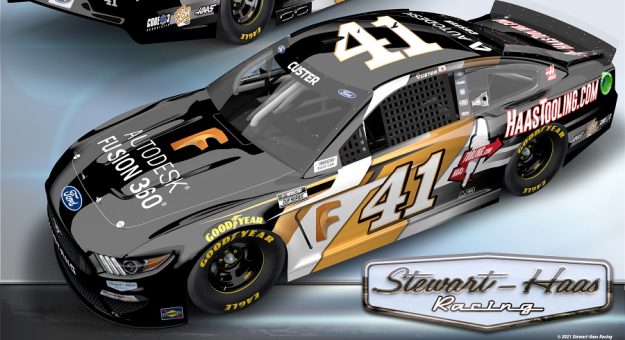KANNAPOLIS, N.C. – Stewart-Haas Racing has expanded its partnership with Autodesk, Inc., a leader in software applications for the engineering, manufacturing, construction, architecture, media and entertainment industries.
Autodesk will be the primary partner for NASCAR Cup Series driver Cole Custer and the No. 41 team for six races, beginning Sunday at Sonoma (Calif.) Raceway, a hometown race for San Francisco-based Autodesk.
After Sonoma, the No. 41 Autodesk Fusion 360/HaasTooling.com Ford Mustang will race Aug. 15 at the Indianapolis Motor Speedway road course, Aug. 28 at Daytona (Fla.) Int’l Speedway, Sept. 18 at Bristol (Tenn.) Motor Speedway, Oct. 3 at Talladega (Ala.) Superspeedway and Oct. 10 at the Charlotte Motor Speedway ROVAL in Concord, N.C.
“Autodesk is more than just a sponsor – it’s a key asset in making our cars perform every weekend,” said Greg Zipadelli, Vice President of Competition, SHR. “How we stay on top of new technologies while ensuring reliability is directly attributable to Autodesk and its technical support.”
This season marks Autodesk’s fourth year with SHR, and the partnership is more than skin deep. The team uses Autodesk’s Fusion 360 design and manufacturing software extensively to create lightweight, but strong, components for its fleet of race cars.
“Motorsports is a great showcase for our manufacturing software, and in working with Stewart-Haas Racing, we see firsthand how our technology helps the team turn a creative idea into a tangible component that ultimately delivers wins as an outcome,” said Scott Reese, Executive Vice President of Product Development and Manufacturing Solutions, Autodesk. “We’re proud to play a role in the team’s success.”
One particular example where SHR took full advantage of Autodesk’s Fusion 360 software was in the redesign of a basic, yet key, component of the race car – the brake pedal.
“We undertook the brake pedal project primarily for weight savings,” said Walter Mitchell, Engineering Integration Manager, SHR. “Our existing brake pedal was designed and manufactured using traditional methods. Through previous iterations and revision, we could no longer produce or realize any additional weight savings.”
The new pedal accounts for a 32 percent reduction in weight with a 50 percent increase in stiffness, with the optimized design being realized by Fusion 360. The entire project took just two months to complete – from initial design to simulation, additive manufacturing of the pedal, testing and finalized part.
“We tested the pedal on an in-house designed test rig to simulate normal braking events over multiple race distances,” Mitchell said. “We set the pedal up in a fixture to simulate driver input load under normal braking conditions of 150 pounds, as well as panic braking loads of 350 pounds. Those braking events were conducted at a cycle of 6,000 events, which represents 3,000 laps of braking, and the pedal withstood all of those loads and cycles flawlessly.”
